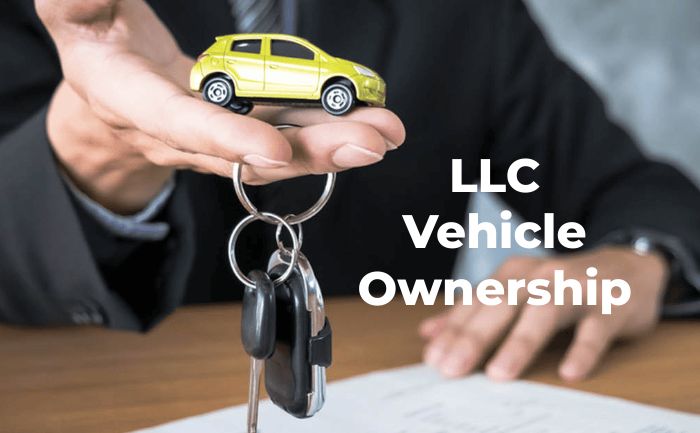Using an LLC for vehicle ownership offers benefits like liability protection and tax deductions, but also has implications to consider. This guide covers everything you need to know about LLC vehicle ownership – from titling and insurance to deductions and more.
Key steps for LLCs owning vehicles include: forming the LLC properly, titling and registering the vehicle with the state under the LLC’s name, getting commercial auto insurance, keeping detailed mileage logs, taking advantage of deductions like depreciation and mileage rate, and understanding implications if selling the vehicle. With good record-keeping and alignment to regulations, an LLC can fully utilize vehicles as business assets.
Steps for an LLC to Own a Vehicle
Follow these key steps to ensure your LLC properly owns and operates vehicles:
Form the LLC
First form your LLC by filing formation documents like Articles of Organization with your state. This establishes the LLC as a legal entity that can own assets.
Title and Register the Vehicle
To transfer ownership, title and register the vehicle with the Department of Motor Vehicles in the LLC’s name.
Get Commercial Auto Insurance
Insure LLC vehicles under commercial policies using the LLC’s name, not personal insurance.
Keep Mileage Logs
Carefully track mileage for deducting business vs personal use, and keep gas/repair receipts.
Take Tax Deductions
Claim available deductions like depreciation, mileage rate, gas, repairs and insurance.
Understand Sales Implications
If selling the vehicle, both depreciation and sale profits may be taxable.
Follow State Regulations
Comply with your state’s specific laws and regulations for LLC vehicle ownership.
Benefits of Buying a Car Under an LLC
There are good reasons to consider buying a car under an LLC:
Liability Protection
If in an accident, your personal assets are generally protected under the LLC.
Tax Deductions
Expenses can be written off as business deductions to reduce your tax burden.
Privacy
LLC ownership keeps your name off public vehicle records for added privacy.
Steps to Transfer a Personal Vehicle to an LLC
To transfer a personally owned vehicle to your existing LLC:
- Obtain a certificate of title for the vehicle in your personal name
- Create a bill of sale documenting transfer from you to your LLC
- Apply for a new title with the LLC as owner using its EIN
- Cancel your personal auto insurance policy
- Obtain commercial auto insurance in the LLC’s name
- Keep detailed mileage logs for business vs personal use
- Deduct eligible expenses on your LLC’s tax return.
Requirements for an LLC-Owned Vehicle
When owning vehicles through your LLC, you must:
- Use the vehicle over 50% for business purposes
- Keep thorough mileage and usage logs
- Have commercial auto insurance in the LLC’s name
- Title and register the vehicle with the state in the LLC’s name
- Keep detailed records of all vehicle-related expenses
Deductions for LLC Owned Vehicles
Some key deductions available include:
Mileage Rate
Taking the standard IRS mileage rate, currently 62.5¢ per mile for business use.
Actual Expenses
Deducting actual costs for gas, repairs, maintenance, insurance, etc.
Depreciation
Deducting a portion of the vehicle’s cost each year as depreciation.
Section 179 Deduction
Potentially deducting up to 100% in the first year if requirements met.
Lease or Loan Payments
Deducting either the lease payment or interest portion of loan payments.
Taxes When Selling an LLC Vehicle
If you sell an LLC owned vehicle, tax implications include:
- Paying capital gains tax on the sale profit
- Recapturing depreciation previously deducted
- Paying self-employment tax on the profits
- Reporting the sale on Form 4797 and Schedule K-1
Be sure to discuss the tax consequences with your accountant before selling.
Alternatives to Using an LLC for a Vehicle
Instead of owning through your LLC, other options include:
- Keeping vehicles titled personally
- Having employees own their own work vehicles
- Leasing vehicles directly in your LLC’s name
- Using a vehicle subscription service like Fair
- Hiring an Uber, Lyft or taxi for transportation
Evaluate if these make more sense than registering vehicles under your business.
Mistakes to Avoid with LLC Owned Vehicles
Steer clear of these common mistakes:
- Insuring vehicles under a personal policy
- Failing to transfer title from personal to LLC name
- Neglecting to keep detailed mileage logs
- Missing deductions you qualify for
- Not understanding tax obligations if selling the vehicle
- Putting luxury vehicles in an LLC when not justified
Conclusion
Form LLC first, transfer title to its name, get commercial insurance. Take mileage, depreciation and other deductions available. Keep thorough logs for business vs personal use. Understand sales may trigger capital gains and depreciation recapture. Follow state rules and meet requirements like 50%+ business use With good planning and recordkeeping, an LLC can utilize vehicles effectively. Just be aware of the responsibilities and tax implications involved. Let me know if you have any other questions!
Frequently Asked Questions
Can I insure an LLC vehicle under my personal insurance policy?
No, an LLC owned vehicle needs to have commercial auto insurance under the business name, not personal insurance. Most personal policies exclude business use vehicles.
Does my LLC need its own EIN to title a vehicle?
Yes, you’ll need an EIN from the IRS for your LLC, you can’t use your SSN, to title and register an LLC owned vehicle. This ties it to the business entity.
Can I lease a car in my LLC’s name rather than buying?
Yes, leasing a car directly in your LLC’s name is an option instead of purchasing, just be sure to get commercial auto insurance for the leased vehicle.
Are vehicle expenses fully deductible if I use it for both business and personal?
No, only the business use percentage is deductible. So if you use a vehicle 50% for business, only 50% of expenses are deductible.
What are the requirements for taking section 179 deduction on an LLC vehicle?
To qualify for the section 179 deduction and write off an LLC vehicle entirely in year one, it must weigh over 6,000 lbs and meet other IRS rules. Consult your tax professional.
This article is created with the aid of automated technology and then carefully reviewed and verified for accuracy by our professional editors.






